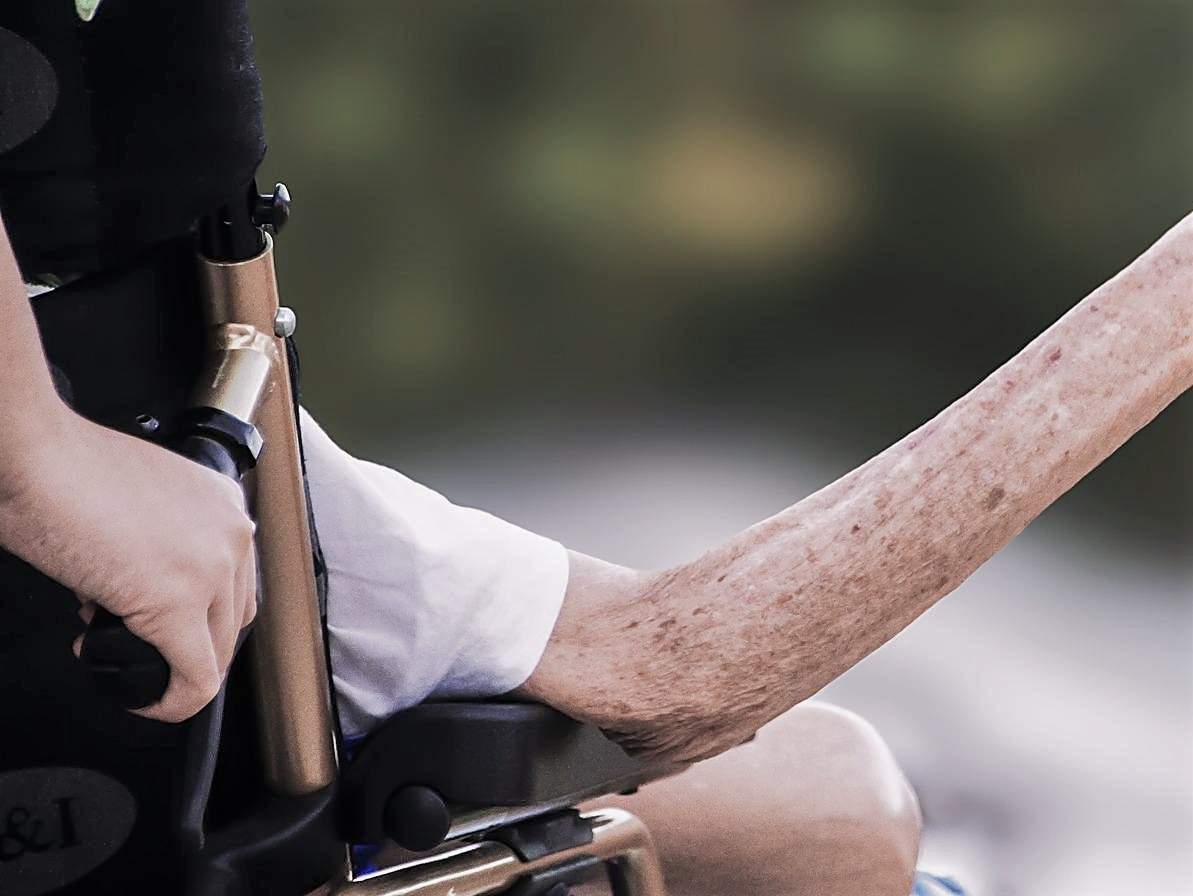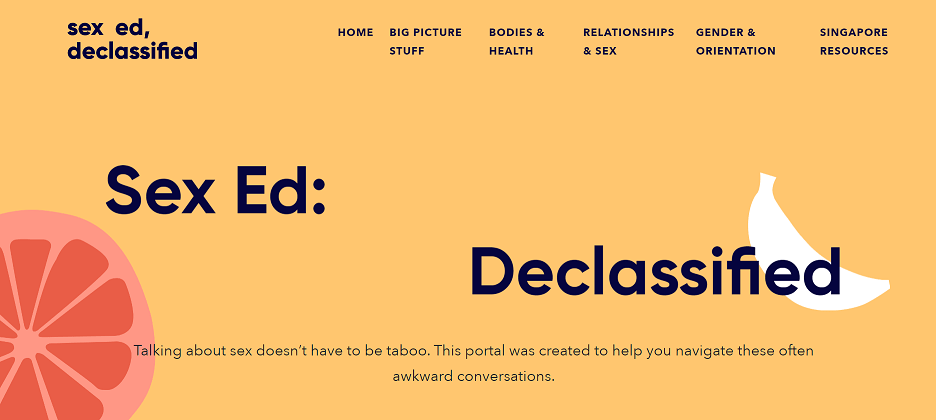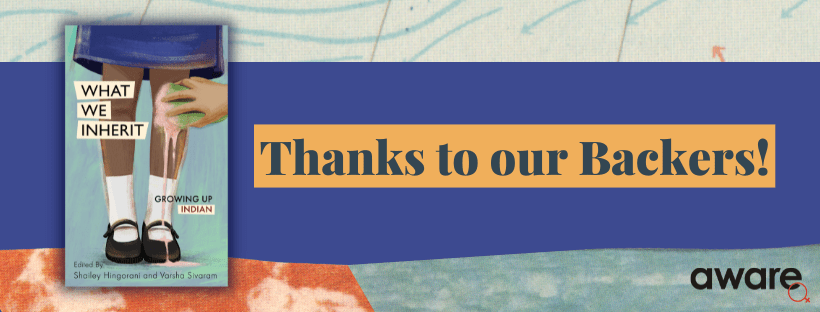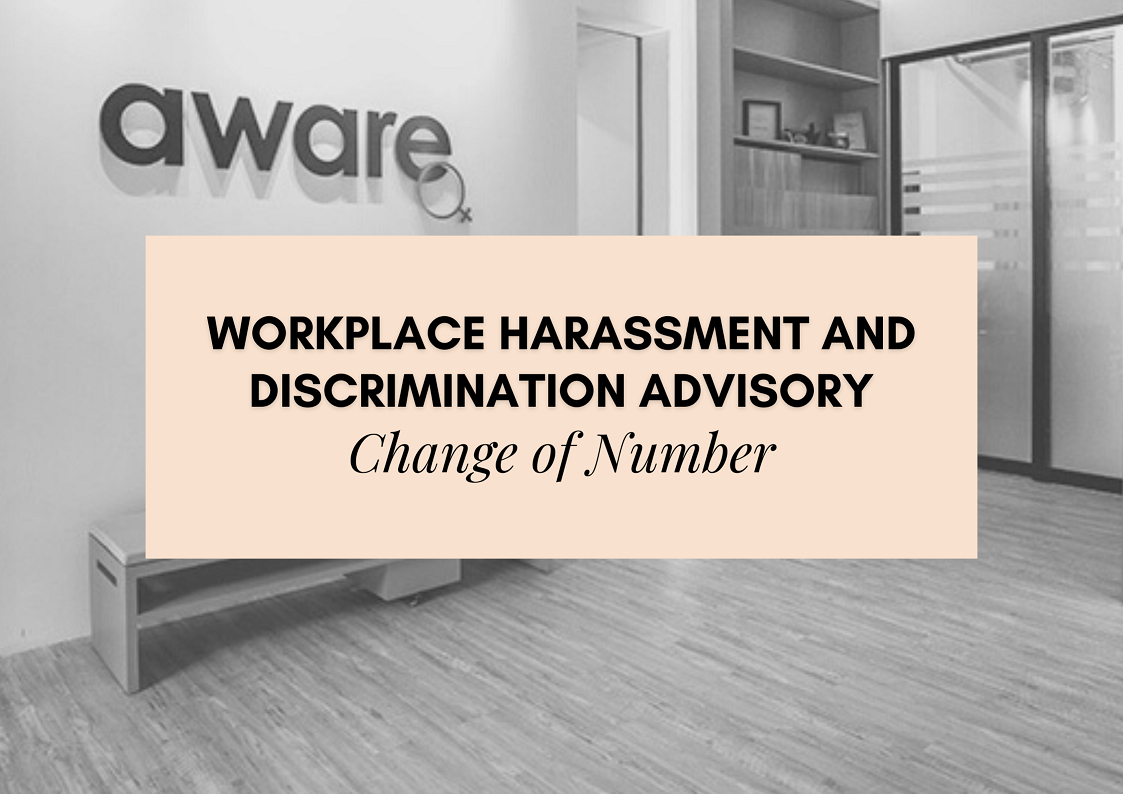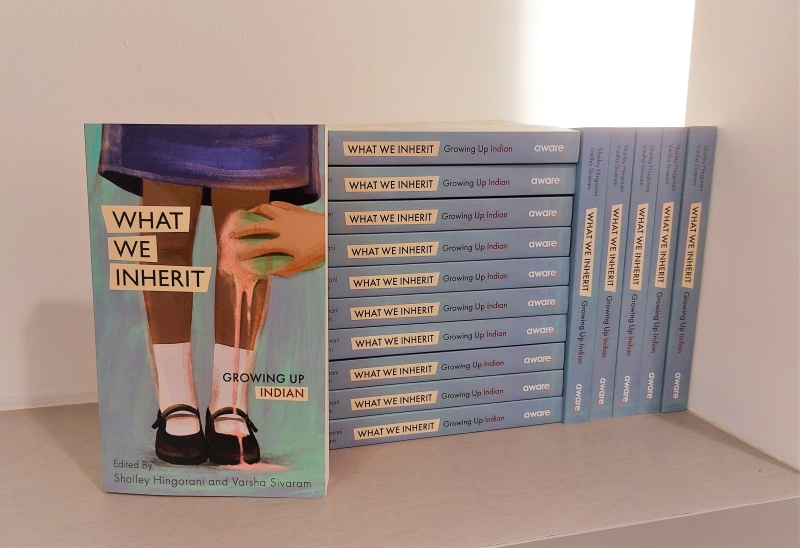
This post was originally published as a press release on 16 July 2022.
16 July 2022 – The confines of official racial categorisations. The melancholy of losing one’s mother tongue. The lifelong escape from intergenerational trauma. The discomfort of sexual fetishisation. These are a few of the themes explored in What We Inherit: Growing Up Indian, an anthology launched today.
The 320-page book is published by gender-equality group AWARE and distributed by Ethos Books. To date, more than 1,100 copies of What We Inherit have been sold: close to 400 pre-orders since 21 June 2022, as well as 737 copies that AWARE pre-sold to supporters in late 2021, via Kickstarter and other channels.
A follow-up to AWARE’s anthologies Perempuan (2016) and Growing Up Perempuan (2019), both of which focused on the Malay-Muslim experience, What We Inherit was produced in 2021 during a rise in racially charged incidents against Indians, exacerbated by Covid-19. Editors Shailey Hingorani and Varsha Sivaram aimed to go beyond simply reiterating the existence of racism and discrimination, and instead capture a fuller picture of the intersection of gender and Indian identity.
The result is 38 personal essays and poems, divided into five sections: “What We Inherit”, “What We Endure”, “How We Speak”, “How We Identify” and “How We Find Joy”. These pieces comprise submissions from both writers new to personal non-fiction, and veteran writers, including Akshita Nanda, Balli Kaur Jaswal and Pooja Nansi; former AWARE president Constance Singam, comedian Sharul Channa, artist ila and historian Mandakini Arora. They grappled with such sensitive issues as migration, colourism, microaggressions, domestic violence and menstruation stigma, in addition to more light-hearted fare—Bollywood fandom, Bohri cuisine, Indian classical dance, “kitty parties” and more.
Co-editor Shailey Hingorani, Head of Research and Advocacy at AWARE, said, “Rather than only reading about themselves during news cycles about racism, discrimination or some other pigeonholed experience, we wanted contributors to reflect on their experiences of inheritance, identity and finding joy. We wanted them to feel unencumbered by the expectations typically placed on minority writers—to speak in polite tones, to talk about their experiences in the most accessible terms. What would happen if we removed these constraints? What would happen if women could lean into their anger, let go of ‘shame’ and speak freely? These questions guided the editorial process for What We Inherit.”
AWARE had earlier raised $21,190 from 255 Kickstarter backers to fund a 500-copy print run. The initial print run was increased to 1,500, however, to meet high demand.
“The robust pre-sales for What We Inherit, and the enthusiastic public responses, have been very affirming,” noted Ms Hingorani. “There is evidently a hunger for the candid personal stories this book brings together.”
Beyond What We Inherit, AWARE’s broader Growing Up Indian initiative includes a website with additional stories (to be unveiled in Q4 2022), a new play by Sharul Channa and a workshop series on interviewing and documentary, creative writing and cross-cultural understanding.
Essays in What We Inherit include:
- “School Colours” by Sujatha Raman, in which the author recounts incidents of racist bullying, at the hands of a teacher, that she witnessed in primary school
- “Regardless of this Body” by Jaryl George Solomon, in which the author reflects on his search for sexual fulfilment and self-worth as a queer “big Brown boy”
- “Limpeh Says, You Not a Foreigner Anymore: How a card game became my crash course in Singaporean culture” by Anisha Ralhan, in which a new migrant describes the unexpected key that unlocked her assimilation into the Singapore workplace
What We Inherit will be officially launched on 16 July with a private celebration at 10 Square. The book will subsequently be available in paperback online and in bookstores such as Kinokuniya, Epigram Bookshop and Grassroots Book Room, and as an e-book via Ethos Books. Both versions are priced at $14.02 (before GST), $15.00 (after GST).
What We Inherit on Ethos Books: bit.ly/growingupindian
Advance Praise for What We Inherit
“Brimming with nuanced reflexivity, vivacious sparkle, and ultimately, resilient joy, What We Inherit: Growing Up Indian is an essential read, regardless of race.”
– Amanda Lee Koe, author of Ministry of Moral Panic
“The wide-ranging voices in this collection—some funny, others heartbreaking—illuminate topics such as the body, dancing, rituals, fandom and sisterhood. This is a book to gift to those (including ourselves) still catching up with Singapore’s dazzling diversity, with the dedication: start here.”
– Alfian Sa’at, poet and playwright
“This anthology is a work of advocacy grounded in intersectional feminism, a project committed to the integrity of the collective and the individual. The effort is ground-breaking, simply but powerfully, in its intent to surface Indian women’s stories in ‘fullness’ and ‘on their own terms’… The candid and moving vignettes reveal that moments of crisis also carry seeds of inspiration, enabling women to rebuild their lives anew, while pushing boundaries of societal expectations. Above all, I see this anthology as a safe space where Indian women’s voices are heard without rebuke, and their experiences articulated with dignity.”
– Professor Vineeta Sinha, Department of Sociology, NUS
“What We Inherit: Growing Up Indian is a timely, relevant and deeply meaningful collection of personal essays, stories and reflections. This beautifully conceived and curated anthology is packed with voices of despair and hope, struggle and freedom, shame and pride. Each contributor shares with the reader their truth, their history, their vulnerability. How specific their stories are, yet how profoundly they resonate.”
– Haresh Sharma, Resident Playwright, The Necessary Stage
“To see a snippet of life through these writers’ eyes is to hold space for a multitude of experiences, both unique and relatable. I laughed, I cried, I learnt and I found strength. Each entry encourages us to challenge the systems we have all inherited… I am also particularly grateful for the mixed-race and queer experiences recorded—I have never before seen these identities sitting on the same page with Indianness in Singapore. It made me feel affirmed and less alone, and I believe any reader will be the better for this crucial book.”
– Jennifer Anne Champion, poet and literary arts educator
“At once intimate and wide-ranging, What We Inherit is a rich portrayal of the histories and lives of Indian women in Singapore. This is an essential read for those who want to gain a deeper understanding of Singapore and Southeast Asia.”
– Jing-Jing Lee, author of How We Disappeared





